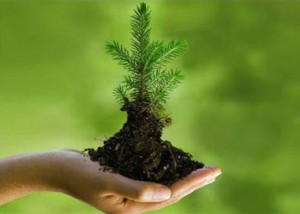Global Warming, Year of Biodiversity 2010

> ÖBf – 800 PROJEKTE DER ARTENVIELFALT <
Global warming is the increase in the average temperature of Earth’s near-surface air and oceans since the mid-20th century and its projected continuation. Global surface temperature increased 0.74 ± 0.18 °C (1.33 ± 0.32 °F) between the start and the end of the 20th century.[2][A] The Intergovernmental Panel on Climate Change (IPCC) concludes that most of the observed temperature increase since the middle of the 20th century was caused by increasing concentrations of greenhouse gases resulting from human activity such as fossil fuel burning and deforestation. Read More: > HERE <
Separating Global Warming from Global Pollution
By David Frawley (Vamadeva Shastri)
The pollution of our natural environment, the decline of the quality of our air, water and soils, the destruction of numerous ecosystems and consequent loss of species is an obvious fact that can be easily documented. We usually don’t have to go much further than our own immediate environment or nearby countryside to see the tell tale signs of this, whether it is the decline of our forests, the garbage in our parks and streets, or the dirty air and noise of our cities. One might have to travel further in the United States than in India to do this, but it doesn’t take much effort if one wants to make it.
We can also look to our childhood memories or talk to our parents about how much nicer our natural environment used to be in terms of the plants, animals and atmosphere in what are now rapidly becoming the good old days, at least for Mother Earth. There may be some areas left that are pristine and much that is now being protected, but most of the forests have been cut and even the normal weather vagaries can cause considerable damage to the altered or depleted landscape, climate changes notwithstanding.
Yet the ecological realm today is dominated by another debate, which is that of global warming. The question is whether this environmental degradation through global pollution may cause global warming or possibly global cooling or neither. However, we should note that global warming is a separate issue and much more difficult to prove or disprove than global pollution.
Global warming has become, it appears by the amount of press and political gatherings, like that at Copenhagen recently, the main issue and the primary global environmental problem, causing passion and vehemence on both sides. The more obvious problem of global pollution and the more immediacy needed to deal with its effects can unfortunately be obscured by this debate. Even if global warming may not be occurring or may not be so rapid, global pollution is staring us in the face and damaging our own lives with an impact on to future generations.
More in ‚David Frawley‘: FOLKS, Full Article
- Linguistics and Civilization
- Vedic Origins of the Europeans: The Children of Danu
- Yoga: From Patanjali Back to Hiranyagarbha
- The Sacred Activism
Co-operation on Health and Biodiversity
Welcome to the website of the COHAB Initiative (Co-Operation On Health And Biodiversity), an international programme of work on human well-being and sustainable development.
The COHAB Initiative works to establish an international, inter-disciplinary framework for dialogue and partnership, supporting activities for community health, international development and biodiversity conservation. The Initiative, through a global network of COHAB Partners, works towards the implementation of the United Nations Convention on Biological Diversity and the Millennium Development Goals. It provides a global forum for all stakeholders to share experiences, discuss needs and opportunities, build capacities and develop new partnerships.
Healthy Planet, Healthy People
Biodiversity, through the provision of ecosystem goods and services, provides the basis for all life on earth. It supports all of our economic and social development, and is vital to our health and well-being. Species of animals and plants have always been important as sources of food, fuels, medicines, clothing and building materials, while ecosystems provide and maintain supplies of clean water, healthy soil and clean air. However, this is frequently taken for granted in an increasingly developed and globalised world.
Truly sustainable development must incorporate all areas of human activity and our interactions with the environment, and therefore requires that social, economic, public health and environmental needs be resolved holistically. In order to fully achieve sustainable progress – whether at local, national, regional or international levels – policy makers, scientists, stakeholders and the wider public must work together.
Die Österreichischen Bundesforste (ÖBf) starten mit über 800 Natur- und Umweltschutzprojekten in das Internationale Jahr der Biodiversität 2010. „Jedes gesunde Ökosystem, jeder gesunde Wald braucht Artenvielfalt“, erklärt Georg Erlacher, Vorstandssprecher der Österreichischen Bundesforste. „Daher ist es unser Ziel, mit naturnaher Waldwirtschaft, der Erhaltung von Schutzgebieten und zahlreichen Einzelmaßnahmen Vielfalt zu sichern und den Verlust von Arten und Lebensräumen zu stoppen.“ Die Bandbreite der Maßnahmen reicht von besonderer Rücksichtnahme auf sensible Brutgebiete über die Ausweisung von Schutz- und Schongebieten bis hin zu großflächigen Moorrenaturierungen. Als erster Forstbetrieb Europas beteiligten sich die Bundesforste am internationalen Biodiversitäts-programm „Countdown 2010“ und haben darauf aufbauend ein eigenes 5jähriges Schutzprogramm zusätzlich zu den bestehenden Maßnahmen entwickelt.
> Meet COHAB Intitative, friends, studies at fb <
> Meet Biodiversity Friends, Groups and Studies at facebook <
> Meet Naturfreunde Groups, Friends, Fans at facebook <
Comments are closed.